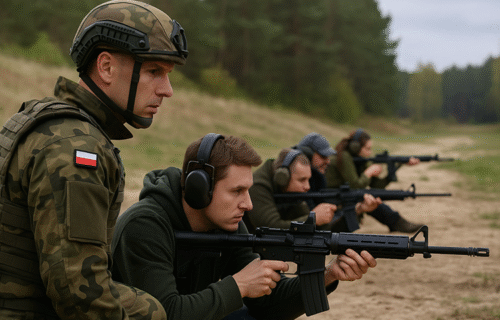Poland has opened a nationwide voluntary readiness programme that invites civilians to take part in structured crisis-response and basic defence training. The initiative, named wGotowości (“mReadiness”), enables adults to register for one-day weekend sessions held at military units around the country. Participants learn skills such as first aid, crisis survival techniques, digital security and basic emergency procedures. The format is designed to be accessible and non-militarised — attendees do not take an oath or enter any reserve list, and participation does not convert into military service.
The programme was presented by Chief of the General Staff Gen. Wiesław Kukuła together with Defence Minister Władysław Kosiniak-Kamysz and Deputy Defence Minister Cezary Tomczyk. Defence leaders described the training as a way to improve individual resilience and to strengthen the country’s reserve readiness. The wider aim is deterrence: to demonstrate that Poland can mobilise large numbers of people with basic preparedness skills without forcing anyone into service. Companies are also being encouraged to send employees to train as teams, reinforcing organisational resilience in the event of a crisis.
The launch comes at a moment of heightened security concerns. Since Russia’s full-scale invasion of Ukraine, Poland has repeatedly faced incidents along its border and within its airspace, including the entry of Russian drones in September 2025 that triggered a NATO response. These events revived public debate over whether Polish society would be prepared to defend itself if conflict escalated.
Opinion surveys suggest that the country is divided. Research by IBRiS for Radio ZET shows that just under half of respondents say they would volunteer in the event of war, while a nearly equal proportion say they would not. Trust in the army is equally mixed. Pollster data indicates that only a minority believe the armed forces would successfully defend the country. Younger adults are the least willing to enlist or volunteer, with almost seven in ten respondents aged 18 to 29 expressing reluctance to take part in defence. Psychologist Professor Adam Tarnowski from Nicolaus Copernicus University views the results with cautious optimism, arguing that even a quarter of the population ready to assist represents significant potential when supported by professional forces.
Poland’s model stands out within NATO. Other countries have voluntary defence or resilience programmes, but none in the same structure. Finland offers large-scale civilian courses focused on survival and crisis planning, Norway and Sweden run public-facing civil-preparedness training, and Estonia’s Defence League integrates volunteers more closely with the armed forces. Germany is preparing a new voluntary service track aimed at recruitment into the army. Poland’s approach differs by letting any adult attend training near their home without entering a recruitment pipeline. Defence officials describe it as the broadest civilian access to crisis-readiness training currently operating in the alliance.
The Polish government intends to expand capacity significantly. Prime Minister Donald Tusk previously said that by 2027 the programme could train as many as one hundred thousand volunteers annually. Kosiniak-Kamysz calls the initiative a step toward building societal resilience rather than simply enlarging the army.
“No other country engages citizens so broadly and so directly,” he said during the programme’s announcement.
As European defence policy evolves and security concerns intensify, Poland is positioning civilian preparedness as a strategic asset. The initiative reflects a shift from relying solely on traditional military structures toward treating the wider population — professionals, families, companies, communities — as an essential component of national security.
Source: IBRiS and CIJ EUROPE Analysis Team
